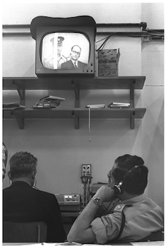VWI invites/goes to...
Cycle of VWI Fellows’ Colloquia
The VWI fellows present their intermediary research results in the context of colloquia which are announced to a small audience and are open to a public audience with an academic and topical interest. The lectures are complemented by a response or commentary by an expert in the given field and are discussed with the other fellows.
Due to the previous lack of an appropriate space, the colloquia were held at other Viennese research and cultural institutions with a topical or regional connection to the given subject. From this circumstance was born the “VWI goes to …” format.
With the move to a new institute building at Rabensteig 3, the spatial circumstances have changed, so that the VWI is now happily able to invite other research and cultural institutions. Therefore, the VWI is now conducting its colloquia both externally and within its own building, in the framework of continued co-operation with other institutions.
The new cycle of fellows’ colloquia “VWI invites/goes to …” is not only able to reach a broader circle of interested persons, but moreover integrates the VWI further into the Viennese scholarly establishment, perhaps even crossing borders into the greater regional research landscape.
| VWI invites/goes to... | |||
| Judith Keilbach: Televising the Eichmann Trial. Holocaust Memory and Foreign Affairs on West German Television | |||
Wednesday, 20. April 2016, 17:00 - 19:00 Zentrum für molekulare Biowissenschaften, SR 44.21, Humboldtstraße 48/II, 8010 Graz
|
|||
VWI goes to the University of Graz
This presentation will first introduce the technical and institutional preconditions that enabled this transnational media event in the first place. It will then focus on West German television broadcasts about the trial. In analysing the special primetime television programme Eine Epoche vor Gericht which aired twice a week it will explore the recurring topics and changing narratives of the reports from Jerusalem. The programme included, for example, extensive coverage of the testimonies of Holocaust survivors, but also had to deal with Eichmann’s bureaucratic language. Taking into account other television programs of that time, this paper argues that the West German coverage of the Eichmann trial reflected the critical endeavours of young journalists to dissect the National Socialist past. At the same time Eine Epoche vor Gericht was in tune with television reports from abroad that brought German viewers, fifteen years after the war had ended, closer to the international community. Finally, the presentation will address how the increasing tension between East and West Germany affected the television coverage of the Eichmann trial. Comments by Ursula K. Mindler-Steiner Judith Keilbach is currently Senior Research Fellow at the VWI. She is Assistant Professor of Television Studies at Utrecht University. She has published articles about Holocaust testimonies and the photographic depiction of the Holocaust, and a book on television documentaries about National Socialism (Geschichtsbilder und Zeitzeugen, 2008). Her current research project deals with the television coverage of the Eichmann trial. Ursula K. Mindler-Steiner is Assistant Professor of Austrian History and Jewish Studies at Graz University and Professor of History at Andrássy University, Budapest. Gerald Lamprecht is Director of the Centre for Jewish Studies and Associate Professor of History at Graz University. |
|||







 The trial against Adolf Eichmann was one of the first transnational television events. When the trial opened on 11 April 1961, journalists from all over the world were in Jerusalem to report on the proceedings. The trial was not only covered in the print media and on radio, but was also recorded for television. Videotapes were sent by plane to broadcasting stations in numerous countries, emphasising the global significance of the event. However, in different countries the trial coverage emphasised different aspects and fulfilled particular functions.
The trial against Adolf Eichmann was one of the first transnational television events. When the trial opened on 11 April 1961, journalists from all over the world were in Jerusalem to report on the proceedings. The trial was not only covered in the print media and on radio, but was also recorded for television. Videotapes were sent by plane to broadcasting stations in numerous countries, emphasising the global significance of the event. However, in different countries the trial coverage emphasised different aspects and fulfilled particular functions.